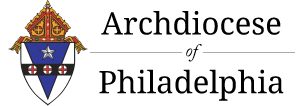This week’s column by the Archbishop is translated and adapted from his September 29 column in the Italian news daily, Il Foglio.
American Catholics have always had a special love for the Holy See. Two of the reasons are obvious: Until technology abolished distance, Rome was safely 4,500 miles away; and unlike her role in Europe, the Church in the United States has never been politically dominant, with all the ugly baggage that implies.
A third reason has been six decades of impressive men in the Chair of Peter.
So when Pope Francis visited Philadelphia at the end of the 2015 World Meeting of Families, nearly a million people turned out to welcome him. Many were families with teens and young children. Many waited hours in line, in the heat, to get through security. Francis was visibly surprised and moved. I was standing beside him. I witnessed it.
Three years later, thanks to a former U.S. cardinal, a Pennsylvania statewide grand jury report, and abuse problems in Chile and elsewhere, the Church is in turmoil. In this turbulent environment, the Holy See will host a world synod of bishops, October 3-28, in Rome. Keyed to the theme of “young people, faith, and vocational discernment,” a more ironic, and more difficult, confluence of bad facts at a bad time for the meeting can hardly be imagined.
This does not mean the synod need fail in its work. Francis’ personal appeal and the good will it can engender remain strong. Viewed globally, the Church’s outreach to young people has more than enough bright spots. In the United States, groups like the Fellowship of Catholic University Students (FOCUS), the Thomistic Institute, the Culture Project, and others have a strikingly positive record with young adults. This is why many young priests, like those who wrote an open letter to delegates of the impending synod last month (9.19), see a great opportunity in the synod’s subject matter. As they make clear, the synod’s success depends on a profound confidence in the Word of God and the mission of the Church, despite the sins of her leaders.
The young American clergy who signed the open letter are a lesson in conviction. Men who commit themselves to the Catholic priesthood at a poisonously negative time, a time when the reputation of bishops can hardly be deeper in the tank, are either fools or men of God. I know some of these young men. They are not fools. When they say, “our culture is all too eager to sell us false idols. Only the Gospel, lived in its radical vigor, can satisfy. Christ alone is the answer to the challenges for our generation,” they mean it, and they will act on it – no matter how skeptical the audience; no matter how implausible they sound to secular ears.
It’s in the light of their faith, and the faith of other young men and women like them, that the synod’s instrumentum laboris or “working document,” needs to be reviewed and revised. As it stands, the text is strong in the social sciences, but much less so in its call to belief, conversion, and mission. In a sense, this isn’t unusual. All synod working documents are works in progress. All undergo discussion and adjustment by the Synod Fathers.
This is important, because the 2018 text does seem to lack some quite vital elements. To borrow the words of one theologian, the document seems to suffer from a range of “serious theological concerns . . . including: a false understanding of the conscience and its role in the moral life; a false dichotomy proposed between truth and freedom,” a “pervasive focus on socio-cultural elements, to the exclusion of deeper religious and moral issues,” an “absence of the hope of the Gospel,” and an “insufficient treatment of the abuse scandal.” Comments like these sound harsh, but they are not wholly unwarranted. A synod that deals with issues of sexuality and young people should also deal — honestly and thoroughly — with the roots of a clergy sexual abuse disaster involving minors.
These are serious matters. Hopefully the 2018 gathering will allow them to be engaged candidly and the text sufficiently improved to ensure the synod’s success. The Francis pontificate has been described as God’s medicine for Churchmen whose notion of the Christian life has grown ill from an overdose of abstraction. In like manner, neither the Pope nor the Church is served – particularly in a time of humiliation and crisis – by an overdose of sentiment, accommodation, and sociology. Faith demands more than that.
Archbishop Chaput is a member of the Synod of Bishops’ permanent council. His term concludes this month.
# # #
Editor’s Note: Columns will be published each week on www.CatholicPhilly.com and can also be found at https://archphila.org/archbishop-chaput/statements/statements.php.






